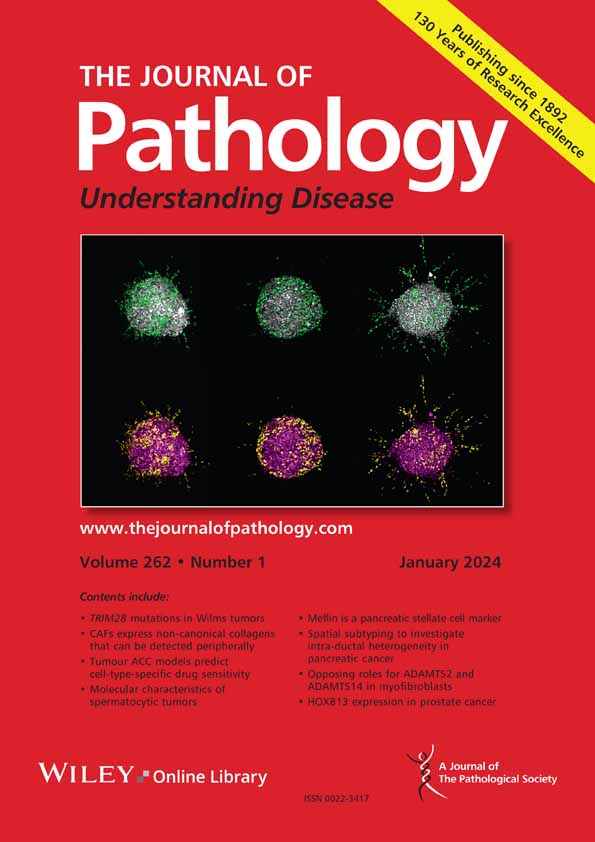Redefining phenotypic intratumor heterogeneity of pancreatic ductal adenocarcinoma: a bottom-up approach
IF 5.2
2区 医学
Q1 ONCOLOGY
Marc Hilmi, Flore Delecourt, Jérôme Raffenne, Taib Bourega, Nelson Dusetti, Juan Iovanna, Yuna Blum, Magali Richard, Cindy Neuzillet, Anne Couvelard, Matthieu Tihy, Louis de Mestier, Vinciane Rebours, Rémy Nicolle, Jérôme Cros
下载PDF
{"title":"Redefining phenotypic intratumor heterogeneity of pancreatic ductal adenocarcinoma: a bottom-up approach","authors":"Marc Hilmi, Flore Delecourt, Jérôme Raffenne, Taib Bourega, Nelson Dusetti, Juan Iovanna, Yuna Blum, Magali Richard, Cindy Neuzillet, Anne Couvelard, Matthieu Tihy, Louis de Mestier, Vinciane Rebours, Rémy Nicolle, Jérôme Cros","doi":"10.1002/path.6398","DOIUrl":null,"url":null,"abstract":"<p>Pancreatic ductal adenocarcinoma (PDAC) tumor interpatient heterogeneity has been well described with two major prognostic subtypes (classical and basal-like). An important intrapatient heterogeneity has been reported but has not yet been studied extensively due to the lack of standardized, reproducible, and easily accessible high-throughput methods. We built an immunohistochemical (IHC) tool capable of differentiating RNA-defined classical and basal-like tumors by selecting relevant antibodies using a multistep process. The successive stages of (i) an <i>in silico</i> selection from a literature review and a bulk transcriptome analysis of 309 PDACs, (ii) a tumor-specific selection from 30 patient-derived xenografts and single-cell data, followed by (iii) the validation on tissue microarrays in 50 PDAC were conducted. We used our final IHC panel on two independent cohorts of resected PDAC (<i>n</i> = 95, whole-slide, <i>n</i> = 148, tissue microarrays) for external validation. After digitization and registration of pathology slides, we performed a tile-based analysis in tumor areas to identify relevant marker combinations. Sequential marker selection led to the following panel: GATA6, CLDN18, TFF1, MUC16, S100A2, KRT17, PanBasal. Four different phenotypes were identified: one classical, one intermediate (KRT17+), and two basal-like (MUC16+ versus S100A2+) with specific biological properties. The presence of a minor basal contingent drastically reduced overall survival [hazard ratio (HR) = 1.90, <i>p</i> = 0.03], even in classical predominant PDACs. Analysis of preneoplastic lesions suggested that pancreatic carcinogenesis might follow a progressive evolution from classical toward a basal through an early intermediate phenotype. In conclusion, our IHC panel redefined and easily assessed the high degree of intra- and intertumoral heterogeneity of PDAC. © 2025 The Author(s). <i>The Journal of Pathology</i> published by John Wiley & Sons Ltd on behalf of The Pathological Society of Great Britain and Ireland.</p>","PeriodicalId":232,"journal":{"name":"The Journal of Pathology","volume":"265 4","pages":"448-461"},"PeriodicalIF":5.2000,"publicationDate":"2025-02-11","publicationTypes":"Journal Article","fieldsOfStudy":null,"isOpenAccess":false,"openAccessPdf":"https://onlinelibrary.wiley.com/doi/epdf/10.1002/path.6398","citationCount":"0","resultStr":null,"platform":"Semanticscholar","paperid":null,"PeriodicalName":"The Journal of Pathology","FirstCategoryId":"3","ListUrlMain":"https://pathsocjournals.onlinelibrary.wiley.com/doi/10.1002/path.6398","RegionNum":2,"RegionCategory":"医学","ArticlePicture":[],"TitleCN":null,"AbstractTextCN":null,"PMCID":null,"EPubDate":"","PubModel":"","JCR":"Q1","JCRName":"ONCOLOGY","Score":null,"Total":0}
引用次数: 0
引用
批量引用
Abstract
Pancreatic ductal adenocarcinoma (PDAC) tumor interpatient heterogeneity has been well described with two major prognostic subtypes (classical and basal-like). An important intrapatient heterogeneity has been reported but has not yet been studied extensively due to the lack of standardized, reproducible, and easily accessible high-throughput methods. We built an immunohistochemical (IHC) tool capable of differentiating RNA-defined classical and basal-like tumors by selecting relevant antibodies using a multistep process. The successive stages of (i) an in silico selection from a literature review and a bulk transcriptome analysis of 309 PDACs, (ii) a tumor-specific selection from 30 patient-derived xenografts and single-cell data, followed by (iii) the validation on tissue microarrays in 50 PDAC were conducted. We used our final IHC panel on two independent cohorts of resected PDAC (n = 95, whole-slide, n = 148, tissue microarrays) for external validation. After digitization and registration of pathology slides, we performed a tile-based analysis in tumor areas to identify relevant marker combinations. Sequential marker selection led to the following panel: GATA6, CLDN18, TFF1, MUC16, S100A2, KRT17, PanBasal. Four different phenotypes were identified: one classical, one intermediate (KRT17+), and two basal-like (MUC16+ versus S100A2+) with specific biological properties. The presence of a minor basal contingent drastically reduced overall survival [hazard ratio (HR) = 1.90, p = 0.03], even in classical predominant PDACs. Analysis of preneoplastic lesions suggested that pancreatic carcinogenesis might follow a progressive evolution from classical toward a basal through an early intermediate phenotype. In conclusion, our IHC panel redefined and easily assessed the high degree of intra- and intertumoral heterogeneity of PDAC. © 2025 The Author(s). The Journal of Pathology published by John Wiley & Sons Ltd on behalf of The Pathological Society of Great Britain and Ireland.
重新定义胰腺导管腺癌的肿瘤内表型异质性:一种自下而上的方法。
胰腺导管腺癌(PDAC)肿瘤患者间异质性已被很好地描述为两种主要的预后亚型(经典亚型和基底样亚型)。一个重要的患者内部异质性已被报道,但由于缺乏标准化、可重复且易于获得的高通量方法,尚未进行广泛研究。我们构建了一种免疫组织化学(IHC)工具,能够通过多步骤选择相关抗体来区分rna定义的经典和基底样肿瘤。(i)从文献综述和309个PDAC的大量转录组分析中进行计算机筛选,(ii)从30个患者来源的异种移植物和单细胞数据中进行肿瘤特异性筛选,然后(iii)在50个PDAC中进行组织微阵列验证。我们在两个独立的PDAC切除队列(n = 95,全切片,n = 148,组织微阵列)上使用最后的免疫组化面板进行外部验证。在对病理切片进行数字化和登记后,我们对肿瘤区域进行了基于tile的分析,以确定相关的标记组合。序列标记选择产生以下面板:GATA6, CLDN18, TFF1, MUC16, S100A2, KRT17, PanBasal。鉴定出四种不同的表型:一种经典表型,一种中间表型(KRT17+)和两种具有特定生物学特性的基底样表型(MUC16+ vs S100A2+)。即使在典型的优势型pdac中,少量基底变异的存在也会显著降低总生存率[风险比(HR) = 1.90, p = 0.03]。对肿瘤前病变的分析表明,胰腺癌的发生可能遵循从经典到基础到早期中间表型的渐进进化。总之,我们的IHC小组重新定义并容易评估PDAC在肿瘤内和肿瘤间的高度异质性。©2025作者。《病理学杂志》由John Wiley & Sons Ltd代表大不列颠和爱尔兰病理学会出版。
本文章由计算机程序翻译,如有差异,请以英文原文为准。
来源期刊
期刊介绍:
The Journal of Pathology aims to serve as a translational bridge between basic biomedical science and clinical medicine with particular emphasis on, but not restricted to, tissue based studies. The main interests of the Journal lie in publishing studies that further our understanding the pathophysiological and pathogenetic mechanisms of human disease.
The Journal of Pathology welcomes investigative studies on human tissues, in vitro and in vivo experimental studies, and investigations based on animal models with a clear relevance to human disease, including transgenic systems.
As well as original research papers, the Journal seeks to provide rapid publication in a variety of other formats, including editorials, review articles, commentaries and perspectives and other features, both contributed and solicited.







 求助内容:
求助内容: 应助结果提醒方式:
应助结果提醒方式:


